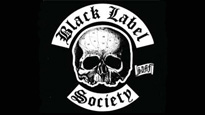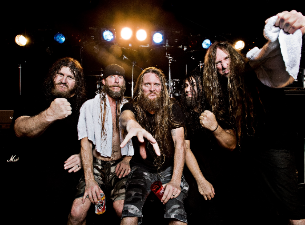About This Event
Artist Info

With Black Label Society, guitarist and one-time Ozzy sideman Zakk Wylde found a lasting home for his ferocious metal picking. Formed in the late '90s, the outfit features a rotating lineup and Wylde taking on the bulk of the instruments. At its heart a Southern metal band, BLS melds the whiskey-soaked spirit of '70s rockers like Lynyrd Skynyrd with the unleashed chaos of '80s thrashers such as Slayer.
After falling out with mentor Ozzy Osbourne following the recording sessions for 1995's Ozzmosis, Wylde struck out on his own with his first solo album, Book of Shadows, in 1996. When it failed to score any mainstream success, the six-stringer took an extended break before resurfacing in 1999 with a new album and band called Black Label Society, featuring Wylde on vocals, guitar, and bass and drummer Phil Ondich. A number of different musicians would sift through the band's ranks during the convoluted tour that followed, but Ondich was back on the drum stool by the time Black Label Society recorded 2000's Stronger Than Death album for new label Spitfire Records. The subsequent tour included a slot on the second stage of his old boss' Ozzfest tour and yielded the Alcohol Fueled Brewtality Live!! album in 2001. The band returned to Ozzfest the following year (this time on the main stage) in support of the 1919 Eternal LP. Blessed Hellride appeared in 2003 and Hangover Music, Vol. 6 followed a year later. Mafia, Black Label Society's seventh album, was released in spring 2005. The following October, Spitfire Records issued the Wylde work compilation Kings of Damnation: Era 1998-2004.
In 2006, the band began its relationship with the Roadrunner label with a new album, Shot to Hell. Black Label Society's engagement with Roadrunner was short-lived, with the band departing the label the following year. Most of 2007 was spent with the members pursuing other projects -- Wylde once again toured with Ozzy, while current members bassist JD DeServio and guitarist Nick Catanese concentrated on their own bands. A compilation called Skullage appeared in 2009, then Wylde pulled the band -- now featuring Catanese, DeServio, and drummer Will Hunt -- into the studio for Order of the Black, Black Label Society's eighth album, released in the summer of 2010. Another studio album, The Song Remains Not the Same, appeared the following year. In 2013, Black Label Society decided to show fans a different side to their sound on the live album Unblackened, which found them dialing back the intensity of some of their past work in order to expose the bluesy roots at the heart of their sound. The following year, Wylde and company returned with new material, releasing Catacombs of the Black Vatican in 2014. October 2017 saw the release of the single "Room of Nightmares" in anticipation of the arrival of the band's tenth studio long-player, Grimmest Hits, which dropped in January 2018. The following year saw Black Label Society issue a reimagined version of their 1999 debut titled Sonic Brew: 20th Anniversary Blend 5.99-5.19.

Upon switching their name from Xecutioner to Obituary, the career of one of the most successful and influential Death Metal bands began. Hailing from Florida and featuring John Tardy (vocals), brother Donald Tardy (drums), Trevor Peres (guitar), Allen West (guitar), and Daniel Tucker (bass), the band signed to Roadracer Records, a now defunct division of Roadrunner, for the recording of their debut album—the immense and immeasurably heavy “Slowly We Rot” (1989). The album was engineered by the legendary Scott Burns at Morrisound Studio, which would come to be the most sought after facility for production of albums during 1990’s rise of the Death Metal genre. Unlike much death metal preceding it, the album had a sludgy feel and integrated devastatingly slow passages along with obliterating overtures that reached far beyond any point of mayhem that metal had yet to reach; the result was a carnal pleasure for doom, death and thrash fans alike coupling the adrenaline of a speedball with the slow, degrading measures of a sewer at dusk. Like them or not, Obituary was unlike anything anyone had heard before.
“Slowly We Rot” was chaotic, bass heavy mix of manic guitar solos and crashing drums, but it was undeniably characterized by vocalist John Tardy’s disarmingly horrific, gargling style, that created guttural chasms of dread which though often strived for, to date have been paralleled by none. The ability to augment tempo so drastically became the band’s trademark along with Tardy’s unique vocal style, which distinguished them clearly from the rest of the emerging Florida Death Metal bands; nowhere is this more apparent than on the prophetic title track of their debut. The fact that Obituary refrained from printing lyric sheets with their albums led people to believe that they didn't actually write any lyrics. Some may question the verbosity or absence of documented lyrics, however, any true fan has each grunt, growl and howling grimace committed to memory like an utterance from God in painstaking form—what does not exist can not be remembered, and an Obituary show is testimony to the re-creation of what your ears couldn't believe in the first place. Once again bringing augmentation to irony, Live and Dead worked quite well for the quintet, dividing your conscience yet leaving much to the imagination; not since birth have your senses been so graphically assaulted yet pleased at the same time. While such differing sensations once seemed incongruous, Obituary have proven the ability to merge unlikely dichotomies, from their slow-as-hell-yet-fast-as-fuck style to the non-evil, homegrown approach to what would largely become the satanized, bastardized, make-up wearing movement known as Death Metal.
The maturation of the musicians into songwriters taking more visionary and complex forms would soon be heard world wide as Obituary took metal by storm in 1990. Despite their youth upon release of their sophomore offering, “Cause of Death” embodied the confident swagger of the most fearsome pack-leading hound. From the insidious growls of John’s vocals to the barrage of Donald Tardy’s thunderously-metered explosions of double bass, “Cause of Death” was the intention and method as promised by the early threat of “Slowly We Rot”; for Obituary, Death was just the beginning. Accordingly, the title track alone (“Cause of Death”) would be heard, regurgitated, manipulated, complimented and collapsed—but never duplicated—on third and forth generation death metal albums for years to come. Lovecraftian imagery and aural morbidity aside, even a deaf man found fear when confronted by the formidable visage of guitarist Peres; entering Frank Watkins, the hulking henchman of a bassist from South Florida, finally provided long-needed and powerful rhythm stability to the line up. However, the grinding of the axes would not be complete until the return of Xecutioner veteran Allen West, who, along with Peres and Tardy, crafted the foundation for most of Obituary’s most primordial and historic moments. Attack now whole, Obituary had given birth—sight, sound and feel—to a true horror greater than metal had ever known.
The paradox herein lies that Obituary was anything but a summation to and end, but more an exploratory journey into the infinite dehumanization of all that is known, as confronted brazenly by their best selling release yet, “The End Complete” and later followed by the cynical and dark expedition of “World Demise”. Reunited with songwriter West, the band was conjoined like quintuplets sharing life and a name. Though finality was possibly inferred by these titles, Obituary was anything but finished. Ironically, the images conjured by songs such as “Don’t Care”, “Platonic Disease” and “World Demise” seemingly foretold of the millennium as can now be seen daily, displayed plainly across the screens of CNN and reality TV programs world wide; not bad for a bunch of rednecks from Florida with Budweiser dreams and bongwater nightmares.
2004 brings reason for Obituary fans to rejoice, the sunken eyes and heaving cries have all but abated. Obituary has only aspired to live up to the standard they have set for themselves, one that numerous bands have strived to duplicate, but never attained, falling short both creatively and in lack of the unique talent that each member contributes to the near indescribable Obituary sound. Like a forgotten corpse in the basement, Obituary are back to haunt, taunt and fully pollute your senses. Fermenting like waste in the hot Florida sun, Obituary return from hiatus with the voracity of a starven wretch. The forfeiture of time brings blessings of brutality, and assurance that the Dead shall indeed rise again. Such aural abrasion can only be heard on an Obituary album or the live circumcision of a thirty-year-old man, the choice is yours...

Rising out of the expansive early-'90s thrash metal landscape, New York's Prong carved a niche all their own with their minimalist urban take on the genre. After years working as a soundman at New York's CBGB, Tommy Victor (vocals/guitars) drafted doorman Mike Kirkland (bass) and ex-Swans drummer Ted Parsons to form Prong in the mid-'80s. The trio's early independent releases -- Primitive Origins and Force Fed -- were extremely raw and betrayed their hardcore roots. By the time the group signed with Epic for 1990's Beg to Differ, though, Victor and company had transformed into a highly technical thrash metal outfit, shelling out clinical staccato riffs and start-stop rhythms peppered with subtle melodies and occasional bursts of speed. The album's title track was a minor hit, helping to put the band on the map once it received regular exposure on MTV's Headbanger's Ball.
Ex-Flotsam and Jetsam bassist Troy Gregory replaced Kirkland for 1991's Prove You Wrong, which featured another strong single in "Unconditional," but was essentially a creative holding pattern and lost some of the band's momentum. Gregory was soon ousted and supplanted by two ex-Killing Joke and Murder Inc. members in bassist Paul Raven and keyboard player John Bechdel for 1994's Cleansing. Containing arguably their best work, the album saw a slight change of direction toward a more industrial sound, with Victor's precise riffing making way for a greater sense of groove and melody. It did little to increase the group's commercial appeal, however. Prong would disband following 1996's less inspired Rude Awakening. Parsons then went on to join British industrialists Godflesh while Victor toured with goth punks Danzig, but rumors persisted of an eventual Prong reunion.
Prong re-formed in 2000, and after releasing a live album, 100% Live, the bandmembers went back into the studio to write their first studio album in six years, 2003's Scorpio Rising. Signed to Al Jourgensen's 13th Planet label, Prong released their seventh album, Power of the Damager, in 2007. A remix album, Power of the Damn Mixxxer, followed in 2009 before the band returned three years later with Carved Into Stone. Their ninth album, the thrash-heavy Ruining Lives, appeared in May of 2014. The all-covers album Songs from the Black Hole followed in 2015 and featured songs from influences like Bad Brains ("Banned in D.C."), Neil Young ("Cortez the Killer"), and Sisters of Mercy ("Vision Thing"). The following year saw the release of their 11th studio long-player, X (No Absolutes).